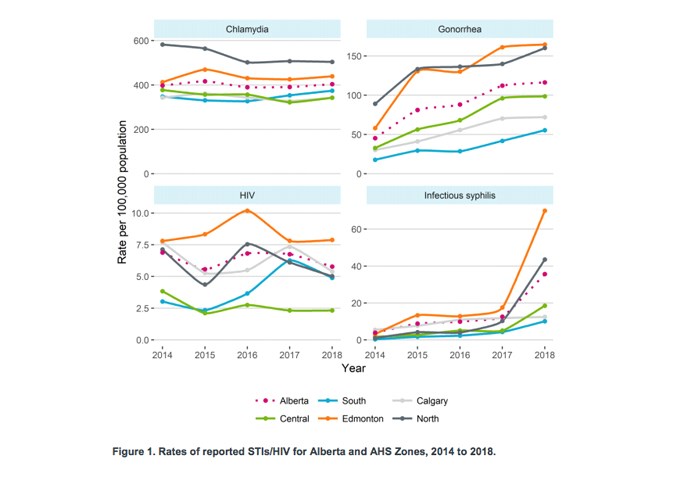Sexually transmitted infections are on the rise across the province, and according to a government report released earlier this month increased syphilis rates are especially concerning.
Dr. Deena Hinshaw, Alberta’s Chief Medical Officer of Health declared a province-wide syphilis outbreak at a press conference July 16.
“A total of 1,536 cases of infectious syphilis were reported in 2018. This is an almost tenfold increase from 2014. And it’s getting worse. From 2017 to 2018 the number of cases jumped 187 per cent, and we’re expecting even higher numbers for 2019,” said Hinshaw, noting the syphilis rate hasn’t been this high since 1948.
When the data is broken down further, the syphilis numbers for the Alberta Health Services north zone, which includes St. Paul, are particularly troubling. According to the report, there were 208 infectious syphilis cases reported in 2018, a 324.5 per cent increase compared to 2017. Provincially, 60 per cent of the cases were diagnosed in men; 31 per cent were in men between 20 and 29 years of age.
“Infectious syphilis and STIs are a risk to anyone who is sexually active, particularly people who have new sex partners and who are not using protection,” said Hinshaw. She encouraged anyone at risk for infection to get tested.
According to information on the AHS website, syphilis is detected through a blood test and treated with antibiotics.
Infectious syphilis is a STI that can cause sores or ulcers at the infection site and a rash on the hands, feet, or whole body, although many infected people do not immediately have symptoms.
“Syphilis is sometimes known as the great imitator because in any branch of medicine you can see someone with late stage syphilis, and they might present with an eye problem or it can affect their ability to think. It can cause dementia, heart problems. Untreated it can cause a great variety of problems,” said Hinshaw. Other problems listed on the AHS website include paralysis, deafness, and blindness.
Congenital syphilis also on the rise
According to Hinshaw, there has also been a coinciding rise in rates of congenital syphilis, which happens when a baby is infected during the mother’s pregnancy.
“This infection can cause deformed bones, jaundice, brain and nerve damage, meningitis, and other serious health problems in the child. While cases of congenital syphilis were rare before the outbreak, there have now been 22 cases in the last two years,” said Hinshaw. According to the report, 13 of the cases were in the Edmonton region including one stillbirth and four cases were in the north zone.
Hinshaw urged all pregnant women to seek out early pre-natal care and get tested for syphilis.
“Congenital syphilis is a disabling and life threatening disease, but if diagnosed and treated early during pregnancy both the mother and baby can have better health outcomes,” said Hinshaw.
Other statistics
Statistics for chlamydia, gonorrhoea, and HIV were also released as part of the report.
Provincially, there was a 4.8 per cent increase in the number of cases of chlamydia in 2018 as compared to 2017. Nearly 60 per cent of those cases are in women, and 61 per cent of women with chlamydia are 15 to 24 years old. In the north zone, there was no change in the number of cases, although the demographics were similar.
Gonorrhoea saw a 5.3 per cent increase across the province compared to 2017. According to the report, 57 per cent of cases were in men, of which 42 per cent were men between the ages of 20 and 29. In the north zone, gonorrhoea is up 15.2 per cent, with similar case demographic percentages.
The one bright spot in the STI report is that HIV cases have decreased 13.2 per cent since 2017 provincially, and 17.2 per cent in the north zone.
“It is important to note that having any sexually transmitted infection such as chlamydia, gonorrhoea, or syphilis can increase the chances of HIV transmission, so all of these things are interlinked,” said Hinshaw.
Senior Medical Officer of Health for AHS Dr. Laura McDougall said one of the challenges with statistics is that “some of the numbers are driven by the volume of testing. So depending on how aggressively the effort is in finding some of the cases, it can at least in the short term explain some of the fluctuation, there’s just no doubt at all that we are in an outbreak situation.”
She urged everyone to take precautions for safer sex, especially through the use of condoms and other barrier methods for people outside of mutually monogamous sexual relationships. According to McDougall, sexually active people should be tested for STIs every three to six months even if they are not experiencing any symptoms.
Local testing available
In an e-mailed statement, an AHS representative said sexual health services for individuals, families and communities are available at St. Paul Community Health Services “including education, clinical services, and consultation.”
“Confidential drop-in or booked appointments include: STI, HIV, and syphilis testing; STI treatment, emergency contraception, birth control information, pregnancy tests, pregnancy options decisions support, and the HPV vaccine.”
St. Paul Community Health Services is open from 8:30 a.m. to 4:30 p.m. Monday to Friday. Appointments can be booked by calling 780-645-3396.
Anyone with symptoms or concerns about an STI can also receive care through Health Link (811) or their primary healthcare provider.



